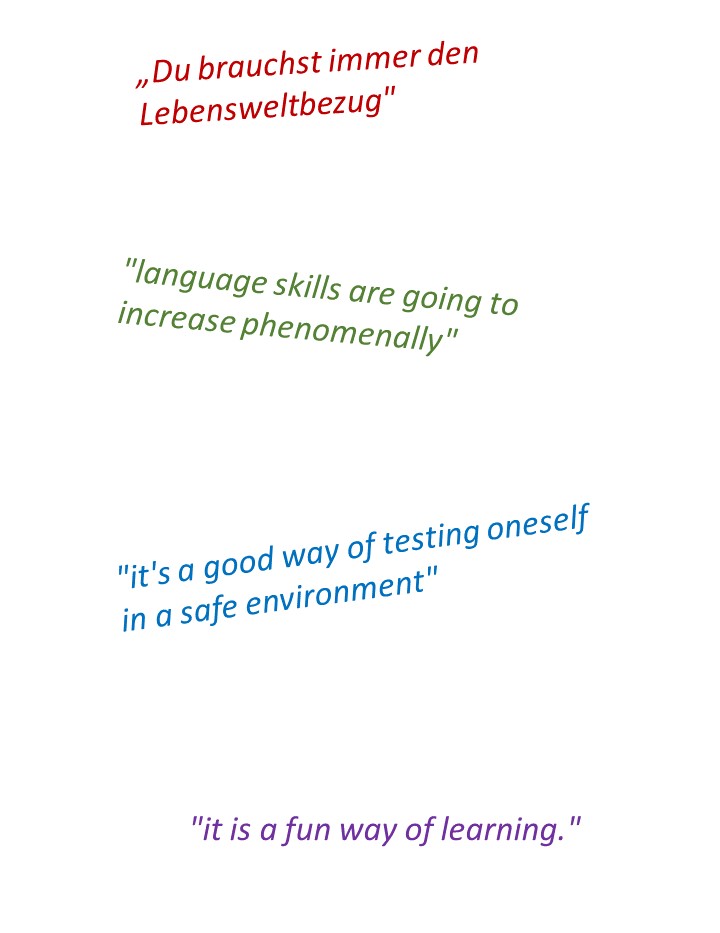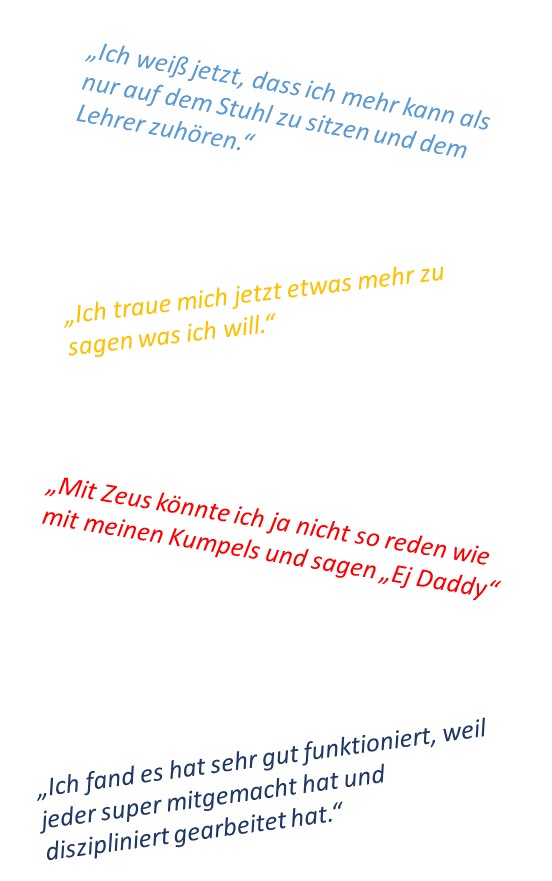Forschung
Projekthintergrund
Das Projekt wird von Wissenschaftler*innen und Studierenden verschiedener Hochschulen im In- und Ausland begleitet und evaluiert. Die Forschung zu Live-Rollenspielen fokussiert unter anderem die Wirkungen auf die Schüler*innen. Im International Journal of Role-Playing (11. Ausgabe, S. 114-131) finden Sie einen zusammenfassenden Artikel unseres Projekts.
Begriffsbestimmungen
Von Educational LARP (EduLARP) zu Student Activating Roleplaying Games (STARS)
LARP (Live Action Role Playing Game) ist eine dramatische Darstellungsform, die sich um ein kohärentes, ko-kreatives, fiktionales Narrativ in einem geschützten Raum entwickelt. LARP kann Kompetenztraining in simulierten authentischen Situationen beinhalten (Literacy, soziale Kompetenzen, ästhetische Fähigkeiten, performative Kompetenz). Im institutionellen Umfeld wird das Spiel unter anderem als EduLARP bezeichnet und von vorbereitenden Workshops und nachbereitenden Reflexionsaktivitäten gerahmt. EduLARP steigert die Motivation, hält die Lernenden zur selbstgesteuerten Vorbereitung an und zeigt multiple Perspektiven zu einer Fragestellung auf. Als Unterrichtsmethode verwendet, kann EduLARP ein Werkzeug für nachhaltiges Lernen sein. Diese Prozesse können zur fachlichen Expertise beitragen und kulturelle und persönliche Entwicklung fördern. Folglich sind mögliche Ergebnisse emotionale Flexibilität und die Fähigkeit, sich an neue Inhalte und Situationen anzupassen. Im Rahmen dieses Projektes wird EduLARP zur Methode STAR weiterentwickelt, die stets den Bildungsplanbezug des Spiels ausweist und zudem im engeren Rahemn schulischen Lernens operationalisierbar ist.

We are happy to announce that as of July 2021, several Starmanufaktur team members are part of the European project “If I were in your shoes. The transformational power of good practice in larping”. All partners apply live roleplaying and related practices in informal and/ or formal contexts to provide a unique immersive experience for trainers and staff of the participating organisations. This is inclusive and holistic performative practice can be applied to a broad range of topics such as peace-building, migration, democracy, etc. Enabled by the Erasmus+ partnership program, we intend to explore and exchange best-practice examples in terms of facilitation and content from the five international partners in this project:
Ludwig-Maximilians-University München, Germany
LajvVerkstaden Sverige ekonomisk förening, Sweden
Associazione Culturale e a.s.d. Laboratorio 41, Italy
BOB, zavod za izobrazevanje in kulturne dejavnosti, Ljubljana, Slovenia
Through this project we aim at giving the staff of all partners the chance to participate and benefit from our gained knowledge and creativity and give professional feedback for further development. Therefore the tools and methods will be evaluated systematically. The duration of the project is June 2021 – June 2023. If you wish to learn more about the project, please contact Katrin Geneuss. Further information is available under http://www.practicelarp.net
Literaturauswahl zu STARS und EduLARP
Bowman, Sarah Lynne, and Anne Standiford. 2015. "Educational larp in the middle school classroom: A mixed method case study." International Journal of Role-Playing 5.1.
Geneuss, Katrin. 2021. "The Use of the Role-playing Technique STARS in Formal Didactic Contexts" In: International Journal of Role-Playing (Issue 11, p. 114-131). http://ijrp.subcultures.nl/wp-content/uploads/2021/12/IJRP-11-Full-Issue.pdf
Geneuss, Katrin, Fabian Obster, Gabriele Ruppert. 2020. “I have gained self-confidence.” Exploring the impact of the role-playing technique STARS on students in German lessons. In: Scenario Journal for Performative Teaching, Learning, Research. XIV Issue 01/2020. S. 44 – 65. Verfügbar unter https://journals.ucc.ie/index.php/scenario/article/view/scenario-14-1-4/html-en
Geneuss, Katrin und Gabriele Ruppert. 2020. „Zeus ist mein Vater, weil ich so mächtig bin wie er!“ Adaptionen griechischer Sagen im Live-Rollenspiel STARS. In: Literatur im Unterricht - Texte der Gegenwartsliteratur für die Schule. 21. Jahrgang, Heft 2 (2020). S. 175- 185.
Geneuss, Katrin. 2019. „Die waren ja mittendrin!“ Ganzheitliches Lernen im Rollenspiel EduLARP. Grundlagen – Wirkungen – Einsatz im Deutschunterricht. Elektronische Hochschulschriften: Ludwig-Maximilians-Universität München. Abrufbar unter: https://edoc.ub.uni-muenchen.de/24863 .
Geneuss, Katrin und Janika Hilgers. 2019. "Unterrichtsbeispiel: Weltraumrundreise.Rollenspiel zur Wertschätzung der Mehrsprachigkeit." In: InfoDaF Bd. 47/ H. 6. DeGruyter online. https://doi.org/10.1515/infodaf-2019-0058 .
Kamm, Björn-Ole, and Julia Becker. 2016. "Live-Action Role-Play or the Performance of Realities." Simulation and Gaming in the Network Society. Springer, Singapore. 35-51.
Mochocki, Michał. 2013. "Edu-larp as revision of subject-matter knowledge." International Journal of Role-Playing 4:55-75.
Neubauer, Alexander. "Liverollenspiel als Unterrichtsmethode." https://1000atmosphaeren.at/2015/10/28/873/
Simkins, David. 2015. The arts of larp: Design, literacy, learning and community in live-action role play. McFarland.
Torner, Evan. 2016. "Teaching German Literature Through Larp: A Proposition." http://ijrp.subcultures.nl/wp-content/uploads/2016/12/IJRP-6-Torner.pdf
Vanek, Aaron, and Andrew Peterson. 2016. "Live Action Role-Playing (Larp): Insight into an Underutilized Educational Tool." Learning, Education and Games.
